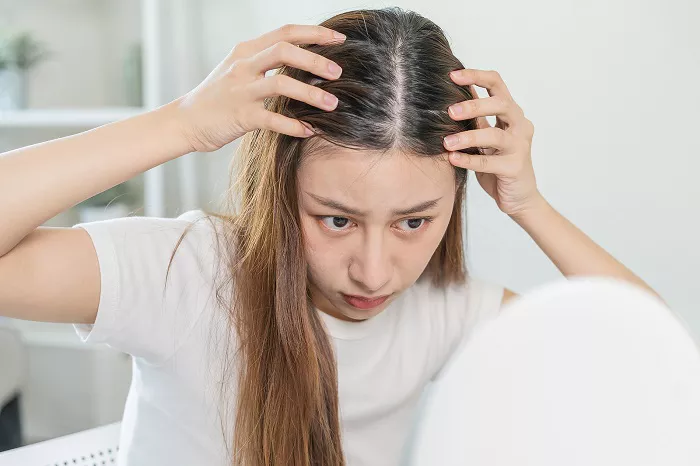I often encounter clients who are experiencing hair loss due to medication. Hair loss is a common side effect of many medications, and it can be a source of stress and anxiety for those who are experiencing it. In this article, we’ll explore the relationship between medication and hair loss, and what you can do to prevent and treat it.
Understanding Hair Growth Cycle
Before we dive into the topic of medication and hair loss, it’s important to understand the hair growth cycle. The hair growth cycle consists of three phases: the anagen phase, the catagen phase, and the telogen phase. The anagen phase is the active growth phase, during which the hair grows. The catagen phase is a transitional phase, during which the hair follicle shrinks and detaches from the blood supply. The telogen phase is the resting phase, during which the hair follicle remains dormant until a new hair begins to grow.
Hair Loss Due to Medication
Hair loss due to medication is a common problem that can occur due to a variety of factors, including chemotherapy, hormonal therapy, and other medications. When the body is exposed to certain medications, it can disrupt the hair growth cycle and lead to hair loss.
Chemotherapy-Induced Hair Loss
One of the most common causes of hair loss due to medication is chemotherapy. Chemotherapy is a type of cancer treatment that uses powerful drugs to kill cancer cells. Unfortunately, chemotherapy can also damage healthy cells, including hair follicles, leading to hair loss.
Chemotherapy-induced hair loss typically occurs within 2-3 weeks of starting treatment. During this time, the hair may fall out in clumps or gradually thin over time. However, hair growth will typically return once chemotherapy treatment is completed.
Hormonal Therapy-Induced Hair Loss
Another common cause of hair loss due to medication is hormonal therapy. Hormonal therapy is a type of cancer treatment that uses hormones to block the growth of cancer cells. Unfortunately, hormonal therapy can also disrupt the hair growth cycle and lead to hair loss.
Hormonal therapy-induced hair loss typically occurs gradually over time and may continue even after treatment is completed. However, hair growth will typically return once hormonal therapy treatment is completed.
Other Medications
Hair loss can also occur as a side effect of other medications, such as antidepressants, blood thinners, and blood pressure medications. The exact mechanism by which these medications cause hair loss is not fully understood, but it is believed to be related to their effects on the hair growth cycle.
Treatment for Hair Loss Due to Medication
Hair loss from medications is a common side effect of many prescription drugs, including chemotherapy drugs, antidepressants, and blood thinners. If you are experiencing hair loss from medications, there are several treatment options available:
Discontinuing the Medication:
In some cases, hair loss from medications can be reversed by discontinuing the medication. However, this is not always possible, especially if the medication is necessary for your health. It is important to talk to your doctor before discontinuing any medication.
Prescription Medications:
There are several prescription medications that can help to slow down or reverse hair loss from medications. Minoxidil and finasteride are two medications that are commonly used to treat hair loss. Minoxidil is a topical medication that is applied to the scalp, while finasteride is an oral medication that is taken daily.
Low-Level Laser Therapy:
Low-level laser therapy is a non-invasive treatment that uses low-level lasers to stimulate hair growth. This treatment is often used in conjunction with other hair loss treatments, such as minoxidil and finasteride.
Hair Transplant Surgery:
Hair transplant surgery is a surgical procedure that involves transplanting hair follicles from one part of the scalp to another. This procedure is most effective for those with male or female pattern baldness and is not recommended for those experiencing hair loss from medications.
Wigs and Hairpieces:
Wigs and hairpieces are a non-invasive option for those experiencing hair loss from medications. They can be custom-made to match your natural hair color and style, and can be worn daily or for special occasions.
It is important to talk to your doctor about the best treatment options for your specific situation. They can help you determine the underlying cause of your hair loss and recommend the most effective treatment options. Additionally, it is important to maintain a healthy diet and lifestyle to support hair growth and overall health.
Preventing Hair Loss Due to Medication
While it may not be possible to completely prevent hair loss due to medication, there are several steps you can take to reduce the risk. Here are some tips for preventing hair loss due to medication:
Talk to your doctor:
If you are concerned about hair loss due to medication, talk to your doctor. Your doctor may be able to adjust your medication or prescribe a different medication that is less likely to cause hair loss.
Eat a healthy diet:
A diet rich in vitamins and minerals can help promote healthy hair growth and prevent hair loss.
Avoid harsh hair treatments:
Harsh hair treatments such as coloring, perming, and straightening can damage the hair and make it more prone to breakage.
Use gentle hair care products:
Using gentle hair care products can help protect the hair and prevent damage.
Conclusion
In conclusion, hair loss due to medication is a common problem that can be a source of stress and anxiety for those who are experiencing it. Understanding the different types of hair loss that can occur due to medication and taking steps to prevent and treat hair loss can help individuals maintain healthy, vibrant hair. By talking to your doctor, making lifestyle changes, and implementing an appropriate treatment plan, individuals can regain their confidence and enjoy beautiful, healthy hair.
Related Topics:

